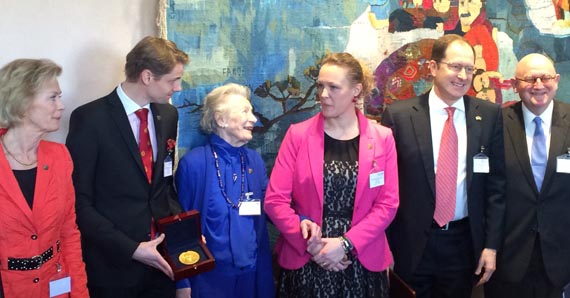
Members of the family of Raoul Wallenberg with Ira Forman and US Ambassador to Sweden Mark Brzezinski at a ceremony to honor Raoul Wallenberg in the Swedish parliament.
In late March, I had the privilege of welcoming Ira Forman to Sweden. Ira is Secretary of State John Kerry's Special Envoy to Monitor and Combat Anti-Semitism. In this capacity, he travels around the world to shed light on prejudice, hatred and violence against Jews and to learn about the important work that individuals and governments are doing to counter anti-Semitism. Since assuming his position in May 2013, he has traveled to 20 countries. This was his first visit to Sweden.
Ira had a very active five-day schedule in Sweden, where he met with a number of government officials, Jewish community leaders, and others who are working to counter anti-Semitism in Sweden. He also participated in an historic and beautiful ceremony in the Swedish parliament to honor the legacy of Raoul Wallenberg--the Swedish diplomat who saved tens of thousands of Jews during World War II. Raoul's sister, Nina Lagergren, presented the Speaker of the Parliament with the Congressional Gold Medal, which the U.S. Congress bestowed on Raoul Wallenberg last year. The medal will be on public display in the parliament building. Ira also joined a representative from the Swedish government and some civil society leaders for a discussion I hosted on how the memory of the Holocaust can be used to combat anti-Semitism.
After Ira's visit, I sat down and asked him a few questions about his time in Sweden.
Why did you choose to visit Sweden?
According to the Anti-Defamation League's (ADL) poll of anti-Semitic views in 102 countries, Sweden has some of the lowest attitudinal levels of anti-Semitism in the world. However, we know from a number of incidents over the years - particularly in Malmö - that anti-Semitism does exist and can make life difficult for some in Sweden's small Jewish community. Moreover, we know that Sweden has some of the same demographics and characteristics of other European countries where anti-Semitic views are much more common.
What were the key highlights from your visit to Sweden?
There is no question that the highlight of my visit to Stockholm was the ceremony where the Wallenberg family presented Raoul Wallenberg's U.S. Congressional Gold Medal for display in the Swedish Parliament building for the next ten years. The presence of members of the Wallenberg family as well as elderly Holocaust survivors who were saved by this Swedish diplomat was truly inspiring.
Inspiration and hope are the two words that come to mind when I look back at my visit to the Videdalskolan school in Malmö. There I met with middle school students who were part of a club dedicated to opposing anti-Semitism and xenophobia. The students were not a stereotypical group of Swedish teenagers. Yes, there were plenty of blond haired and blue eyed students but there were also students from all racial, religious and ethnic backgrounds. More importantly, they were vocal about the type of multi-cultural, tolerant society they wanted to live in. At the same time, we had great conversations about how difficult it can be to stand up for views you know are right.
If the middle school meeting inspired me, my meeting with a least one member of the Jewish community disheartened me. This individual lives in the heart of Malmö. He and his family experience the sting of prejudice, hatred and anti-Semitism nearly every day. From all my meetings I know there are good citizens of Malmö who would be appalled if they were aware of his treatment and who could devise tools to make their city a place that is welcoming to all of its citizens.
What were the key challenges you saw in Sweden?
Sweden has an enviable human rights record and a commendable migration policy track record. The integration of people migrating presents challenges for any country. In Sweden, a small minority of these new arrivals have expressed anti-Semitic attitudes. Efforts to provide education for recent arrivals and to build bridges between them and members of the Jewish community could be useful to reverse the trend.
Are you worried about the long-term viability of Jewish communities in Europe?
Yes, if the current trend of rising anti-Semitism continues, smaller Jewish communities are particularly vulnerable. I continue to be concerned about how young Jews want to emigrate due to the anti-Semitic climate.
Is anti-Semitism a problem throughout Europe? How does anti-Semitism in Sweden compare to other countries in Europe?
Yes, it is a problem throughout Europe and throughout the world. Even in the United States we have some level of anti-Semitism. The nature of anti-Semitism in every country is different. Strategies to push back against anti-Semitism must be developed keeping in mind the particular nature of the unique situation in Sweden.
While you were in Sweden you participated in a ceremony in the Swedish Parliament to honor Raoul Wallenberg. How can we use the legacy of Raoul Wallenberg to combat anti-Semitism?
We all need heroes. Few of us will ever be able to live up to the heroism of Raoul Wallenberg. However, when you read his story, how he sacrificed his life to save thousands of Hungarian Jews in the closing months of World War II, and hear from the now aged survivors who owe their lives to Wallenberg, one understands the power of his story to promote a society that is deeply committed to tolerance and understanding.
Raoul Wallenberg Medal Ceremony at the Swedish Riksdag
Remembering the Holocaust and Combating anti-Semitism